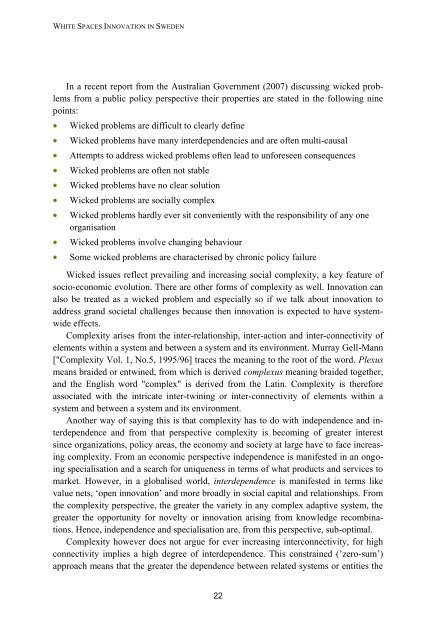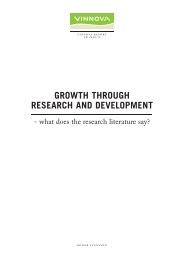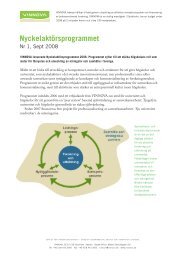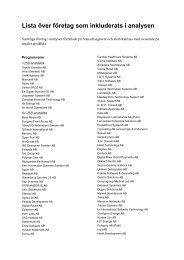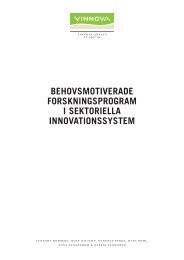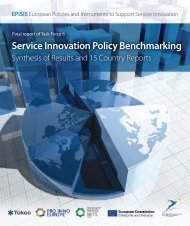White Spaces Innovation in Sweden - Innovation policy for ... - Vinnova
White Spaces Innovation in Sweden - Innovation policy for ... - Vinnova
White Spaces Innovation in Sweden - Innovation policy for ... - Vinnova
You also want an ePaper? Increase the reach of your titles
YUMPU automatically turns print PDFs into web optimized ePapers that Google loves.
WHITE SPACES INNOVATION IN SWEDENIn a recent report from the Australian Government (2007) discuss<strong>in</strong>g wicked problemsfrom a public <strong>policy</strong> perspective their properties are stated <strong>in</strong> the follow<strong>in</strong>g n<strong>in</strong>epo<strong>in</strong>ts:Wicked problems are difficult to clearly def<strong>in</strong>eWicked problems have many <strong>in</strong>terdependencies and are often multi-causalAttempts to address wicked problems often lead to un<strong>for</strong>eseen consequencesWicked problems are often not stableWicked problems have no clear solutionWicked problems are socially complexWicked problems hardly ever sit conveniently with the responsibility of any oneorganisationWicked problems <strong>in</strong>volve chang<strong>in</strong>g behaviourSome wicked problems are characterised by chronic <strong>policy</strong> failureWicked issues reflect prevail<strong>in</strong>g and <strong>in</strong>creas<strong>in</strong>g social complexity, a key feature ofsocio-economic evolution. There are other <strong>for</strong>ms of complexity as well. <strong>Innovation</strong> canalso be treated as a wicked problem and especially so if we talk about <strong>in</strong>novation toaddress grand societal challenges because then <strong>in</strong>novation is expected to have systemwideeffects.Complexity arises from the <strong>in</strong>ter-relationship, <strong>in</strong>ter-action and <strong>in</strong>ter-connectivity ofelements with<strong>in</strong> a system and between a system and its environment. Murray Gell-Mann["Complexity Vol. 1, No.5, 1995/96] traces the mean<strong>in</strong>g to the root of the word. Plexusmeans braided or entw<strong>in</strong>ed, from which is derived complexus mean<strong>in</strong>g braided together,and the English word "complex" is derived from the Lat<strong>in</strong>. Complexity is there<strong>for</strong>eassociated with the <strong>in</strong>tricate <strong>in</strong>ter-tw<strong>in</strong><strong>in</strong>g or <strong>in</strong>ter-connectivity of elements with<strong>in</strong> asystem and between a system and its environment.Another way of say<strong>in</strong>g this is that complexity has to do with <strong>in</strong>dependence and <strong>in</strong>terdependenceand from that perspective complexity is becom<strong>in</strong>g of greater <strong>in</strong>terests<strong>in</strong>ce organizations, <strong>policy</strong> areas, the economy and society at large have to face <strong>in</strong>creas<strong>in</strong>gcomplexity. From an economic perspective <strong>in</strong>dependence is manifested <strong>in</strong> an ongo<strong>in</strong>gspecialisation and a search <strong>for</strong> uniqueness <strong>in</strong> terms of what products and services tomarket. However, <strong>in</strong> a globalised world, <strong>in</strong>terdependence is manifested <strong>in</strong> terms likevalue nets, „open <strong>in</strong>novation‟ and more broadly <strong>in</strong> social capital and relationships. Fromthe complexity perspective, the greater the variety <strong>in</strong> any complex adaptive system, thegreater the opportunity <strong>for</strong> novelty or <strong>in</strong>novation aris<strong>in</strong>g from knowledge recomb<strong>in</strong>ations.Hence, <strong>in</strong>dependence and specialisation are, from this perspective, sub-optimal.Complexity however does not argue <strong>for</strong> ever <strong>in</strong>creas<strong>in</strong>g <strong>in</strong>terconnectivity, <strong>for</strong> highconnectivity implies a high degree of <strong>in</strong>terdependence. This constra<strong>in</strong>ed (‟zero-sum‟)approach means that the greater the dependence between related systems or entities the22


